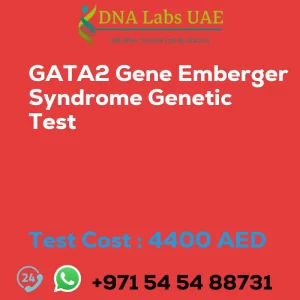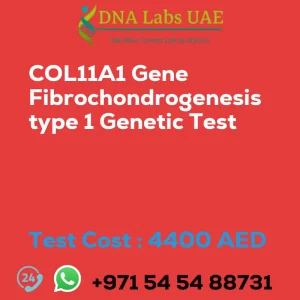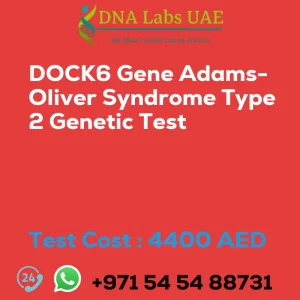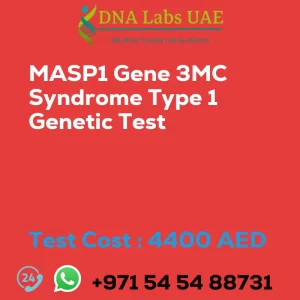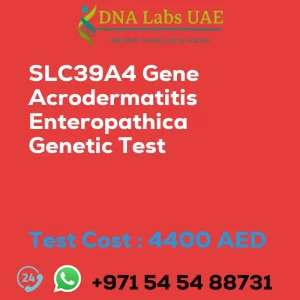COX4I2 Gene Exocrine pancreatic insufficiency dyserythropoietic anemia and calvarial hyperostosis Genetic Test
Test Name: COX4I2 Gene Exocrine pancreatic insufficiency dyserythropoietic anemia and calvarial hyperostosis Genetic Test
Components: Osteology, Dermatology, Immunology Disorders
Price: 4400.0 AED
Sample Condition: Blood or Extracted DNA or One drop Blood on FTA Card
Report Delivery: 3 to 4 Weeks
Method: NGS Technology
Test Type: Genetics
Doctor: Dermatologist
Test Department: Genetics
Pre Test Information: Clinical History of Patient who is going for COX4I2 Gene Exocrine pancreatic insufficiency, dyserythropoietic anemia, and calvarial hyperostosis NGS Genetic DNA Test. A Genetic Counselling session to draw a pedigree chart of family members affected with COX4I2 Gene Exocrine pancreatic insufficiency, dyserythropoietic anemia, and calvarial hyperostosis NGS Genetic DNA Test gene COX4I2
Test Details: The COX4I2 gene is responsible for encoding a protein called cytochrome c oxidase subunit 4 isoform 2, which is involved in the electron transport chain in mitochondria. Mutations in this gene have been associated with various disorders, including exocrine pancreatic insufficiency, dyserythropoietic anemia, and calvarial hyperostosis.
Exocrine pancreatic insufficiency is a condition characterized by a deficiency in the production and secretion of digestive enzymes by the pancreas. This can lead to malabsorption of nutrients and symptoms such as diarrhea, weight loss, and malnutrition.
Dyserythropoietic anemia refers to a group of rare genetic disorders that affect the production of red blood cells. These disorders can result in anemia, fatigue, and other symptoms related to a reduced ability of the blood to carry oxygen.
Calvarial hyperostosis is a condition characterized by abnormal thickening of the bones in the skull, specifically the calvaria. This can lead to symptoms such as headaches, vision problems, and facial deformities.
NGS (Next-Generation Sequencing) genetic testing is a method used to analyze multiple genes simultaneously and identify mutations or variations that may be associated with certain disorders. In the case of the COX4I2 gene, NGS genetic testing can be used to identify mutations that may be causing exocrine pancreatic insufficiency, dyserythropoietic anemia, and calvarial hyperostosis. This can help with the diagnosis of these conditions and provide information for appropriate management and treatment options.
| Test Name | COX4I2 Gene Exocrine pancreatic insufficiency dyserythropoietic anemia and calvarial hyperostosis Genetic Test |
|---|---|
| Components | |
| Price | 4400.0 AED |
| Sample Condition | Blood or Extracted DNA or One drop Blood on FTA Card |
| Report Delivery | 3 to 4 Weeks |
| Method | NGS Technology |
| Test type | Osteology Dermatology Immunology Disorders |
| Doctor | Dermatologist |
| Test Department: | Genetics |
| Pre Test Information | Clinical History of Patient who is going for COX4I2 Gene Exocrine pancreatic insufficiency, dyserythropoietic anemia, and calvarial hyperostosis NGS Genetic DNA Test. A Genetic Counselling session to draw a pedigree chart of family members affected with COX4I2 Gene Exocrine pancreatic insufficiency, dyserythropoietic anemia, and calvarial hyperostosis NGS Genetic DNA Test gene COX4I2 |
| Test Details |
The COX4I2 gene is responsible for encoding a protein called cytochrome c oxidase subunit 4 isoform 2, which is involved in the electron transport chain in mitochondria. Mutations in this gene have been associated with various disorders, including exocrine pancreatic insufficiency, dyserythropoietic anemia, and calvarial hyperostosis. Exocrine pancreatic insufficiency is a condition characterized by a deficiency in the production and secretion of digestive enzymes by the pancreas. This can lead to malabsorption of nutrients and symptoms such as diarrhea, weight loss, and malnutrition. Dyserythropoietic anemia refers to a group of rare genetic disorders that affect the production of red blood cells. These disorders can result in anemia, fatigue, and other symptoms related to a reduced ability of the blood to carry oxygen. Calvarial hyperostosis is a condition characterized by abnormal thickening of the bones in the skull, specifically the calvaria. This can lead to symptoms such as headaches, vision problems, and facial deformities. NGS (Next-Generation Sequencing) genetic testing is a method used to analyze multiple genes simultaneously and identify mutations or variations that may be associated with certain disorders. In the case of the COX4I2 gene, NGS genetic testing can be used to identify mutations that may be causing exocrine pancreatic insufficiency, dyserythropoietic anemia, and calvarial hyperostosis. This can help with the diagnosis of these conditions and provide information for appropriate management and treatment options. |


